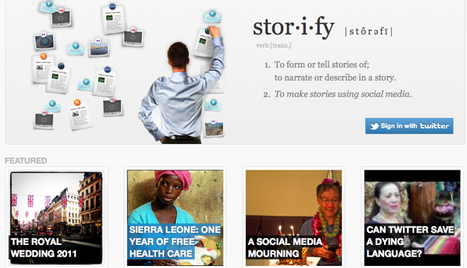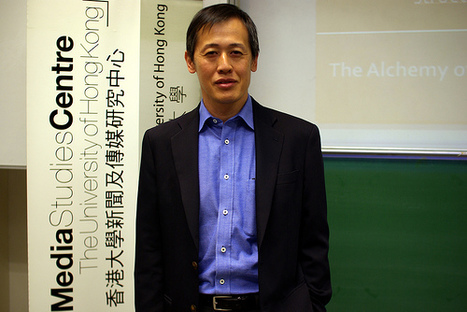 Your new post is loading...
 Your new post is loading...
Spotlight covers the intersections of technology and education, going behind the research to show how digital media is used in and out of classrooms to expand learning.
In the eight-plus years I’ve worked with Jim Romenesko, I’ve spent some time talking with him, more time emailing with him, and — most of all — I’ve admired and observed how he does what he does. But last week, for the first time, I experienced it firsthand when Jim took some well-deserved and unprecedented time off.
In the process I learned three things about content curation:
- The balance between the obligatory and the original is critical.
- What you exclude is as important as what you include.
- Speed kills, but slowness is a painful death of its own.
A Web start-up named Storify, which opens to the public Monday, April 25, 2011, aims to help journalists and others collect and filter all this information.
Storify aims to help journalists and others sift through the explosion of online content and publish the most relevant information.
Using the Storify Web site, people can find and piece together publicly available content from Twitter, Flickr, Facebook, YouTube and other sites. They can also add text and embed the resulting collages of content on their own sites
This should come as no surprise to anyone, but you’re unlikely to be reading this.
After all, you’re pretty busy, I’m sure, and constantly inundated with emails, tweets and news updates all the time. Perfectly understandable; so am I. And unless you’re a regular to this blog – and no, I don’t mean you, mom – then either you came here via a random search query (and guess how many people type “structured journalism” by chance into Google) or followed a tweet or a facebook update here. And let’s face it, who has time?
No one. No one really has time to follow the unending barrage of information that’s coming at us. It’s true, of course, that filtering mechanisms have improved greatly since the early days of the web, mostly courtesy of our friends – real and digital – who we depend on to sort out things we might like to read. As a wisdom-of-the-crowds mechanical turk, it works pretty well. I don’t have to scour the web for articles of interest to me; at least, I don’t have to scour it as much as I used to.
Web 2.0 Expo NY: Clay Shirky (shirky.com) It's Not Information Overload. It's Filter Failure. - Web2Expo - blip.
|
Flockler is all about topics, curation and reader engagement.
We believe in established media and professional journalist's ability to select relevant and interesting topics for their readers.
Flockler team is thrilled to launch the first public version of Flockler – Group Curation Tool for Publishers. April 28, 2011
The explosion of real-time information through social networks like Twitter and Facebook has created an opportunity for "curation" tools such as Storify, which just launched as a public beta.
Tools like Storify allow anyone to perform the same kind of function, regardless of whether they have been trained as a journalist — or even think of what they are doing as journalism.
As the number of information sources grows and become decentralized, here are four ways it helps news organizations and their communities:
1. Better information for the community and someone looking out for their interests to highlight the best.
2. Better journalism because the links to other sources can be put in context and explanations added.
3. More potential traffic and time on site for the news organization, which delivers more value to advertisers or sponsors. (More time on site would derive from having more links to engage readers, not from any assumption that the main site would publish more than teasers.
4. More exposure for smaller sites and other sources of information, who can potentially be part of a network that delivers more value to advertisers and users alike.
It’s impossible to build a computer system that helps people find or filter information without at some point making editorial judgements. That’s because search and collaborative filtering algorithms embody human judgement about what is important to know.
I’ve been pointing this out for years, and it seems particularly relevant to the journalism profession today as it grapples with the digital medium.
It’s this observation which is the bridge between the front page and the search results page, and it suggests a new generation of digital news products that are far more useful than just online translations of a newspaper.
|
 Your new post is loading...
Your new post is loading...
 Your new post is loading...
Your new post is loading...

















